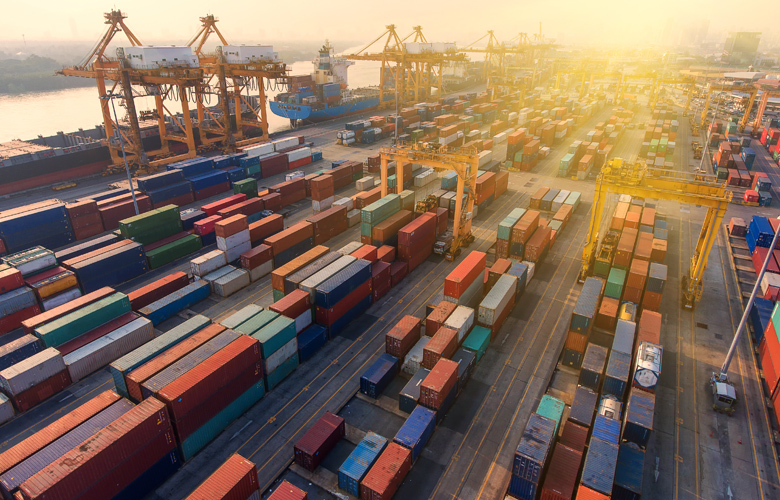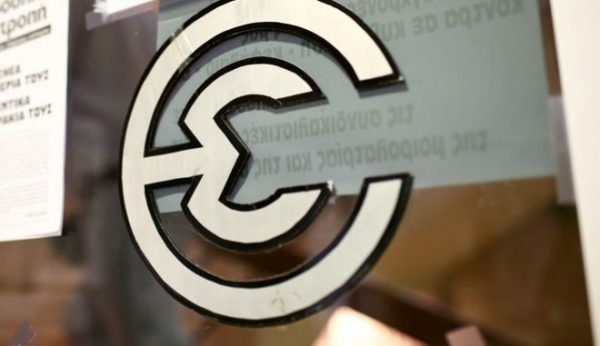
According to the recently published seasonally adjusted data of ELSTAT, net exports (total exports minus total imports) had a significant contribution to the growth of Gross Domestic Product (GDP) on an annual basis, in the first nine months of 2021 to 1.8 percentage points, from 8.9 points of GDP growth, as total exports increased at a faster pace compared to total imports. The increase in exports came primarily from services – which in the corresponding period last year had decreased significantly compared to the first nine months of 2019 – while exports of goods also recorded a significant increase.
The increase in exports of services and especially the good performance of tourism, in the third quarter, but also in October of this year, resulted in the increase of the surplus of the services balance in the ten months of January-October 2021, by 83%, to annual base.
Specifically, travel receipts, although significantly lower than the corresponding receipts of the same period, the pre-pandemic year 2019 (amounted to 58% of them), increased by 142% on an annual basis, while transport receipts increased significantly by 29 %. The increase in the surplus of services – combined with the further improvement in the surpluses of primary and secondary incomes – partially offset the deficit in goods and, therefore, reduced the current account deficit, in 20 months, by 30% compared to the same period last year. It is worth noting that in addition to exports, imports of goods also increased, albeit at a slower pace. As the latter are significantly larger than exports of goods, this has resulted in a deterioration in the trade balance.
The services sector is again financing the deficit balance of goods
In the ten months January-October, from 2013 to 2019, the current account balance was almost balanced (yellow broken line). This is because, during these years, the services surplus covered – on average – the entire trade deficit (red dashed line). In the first ten months of 2020, due to the pandemic, travel restrictions and low tourism performance, the services surplus covered only 42.7% of the trade deficit. In the ten months of January-October 2021, however, this ratio rose again to 60.6%.
The export activity in goods, in the two years 2020-2021, by sector
In the period January-October 2021, exports of goods (including services falling into the categories of information-communication, professional-scientific-technical services, arts-entertainment-entertainment and other services) amounted to 32.4 billion euros and exceeded the corresponding exports both for the same period of 2019 (Euro 28.2 billion) and 2020 in total (Euro 30.8 billion). The increase in exports of goods, in the first ten months of this year, has come mainly from coke and oil refining products (+ 66.3% on an annual basis compared to a corresponding drop of 40% last year) but also from other processed products (+ 18.6%, in total, on an annual basis).
It is noted that the sector with the largest share of total exports of goods in Greece is manufacturing (about 87%, according to 2019 data), followed by agriculture, forestry, fishing (7.2%) and mining; quarries (1.9%), while the main trading partners of our country are Italy, with a share of 10.9%, Germany (6.8%), Cyprus (6.1%), Bulgaria (4, 8%) and France (3.5%). It is noted that more than 50% of Greek exports are directed to European Union countries. In terms of products, coke and oil refining products account for 30.6% of total Greek exports, foodstuffs 10.6% (Graph 2) and base metals 9.2%.
The pandemic crisis has primarily affected the services sector. Thus, the structure of Greek exports of goods did not change significantly in 2020, despite the fact that exports decreased compared to 2019, with the largest declines being recorded in coke and oil refining (-36.7%, on an annual basis), and in the quarry-mines (-21.8%, respectively). Due to the high share of exports of oil refining products and related products in total exports, they also had the largest negative contribution to the annual decline in total exports in 2020.
On the contrary, during the previous year, exports of agricultural products, forestry and fisheries (+ 4.5% on an annual basis), foodstuffs (+ 11.8%) and other processed products (+3 , 1%), whose positive contribution partially offset the decline recorded in the other product categories. Of the other processed products, the largest increase was recorded, in 2020, exports of basic pharmaceuticals and pharmaceuticals by 48.3% on an annual basis.
The export activity, in the ten months of January-October 2021, per product
More specifically, 14 categories of manufacturing products, with a share of more than 1.5% of total exports of manufacturing – in all cases exports increased significantly during the first ten months of 2021, on an annual basis, covering in most cases the losses recorded during the same period of 2020.
Specifically, exports of electrical equipment increased by 45% on an annual basis, compared to an annual decline in the first ten months of 2020 by 4.3%. They are followed by clothing (+ 27.2%), basic metals (+ 25.8%), chemicals (+ 24.2%), metal products -except machinery- (+ 23%), and other non- metallic mineral products (+ 20.6%). It is noted that exports of pharmaceuticals and preparations, computers, electronics and optics, plastics and rubber products, as well as foodstuffs were positively affected by the pandemic, as they recorded an increase in the ten months of January-October 2020, on an annual basis.
The upward trend of the manufacturing sector is also reflected in the evolution of the Purchasing Managers Index (PMI), which remains above 50 points from March 2021, indicating the significant improvement of the operating conditions in industry. Specifically, in November, the PMI index stood at 58.8 points, which is the third highest performance recorded since April 2000, with the immediately highest values being recorded in October and August 2021 (58.9 points and 59.3 points, respectively).
At the same time, estimates for manufacturing exports in the last quarter, according to the European Commission’s monthly survey, went into positive territory from May this year onwards (with the exception of August-September), for the first time since August 2018. However, shortages of raw materials due to disruptions in supply chains, as well as rising energy prices, are increasing industry production costs and, therefore, may slow the course in the short term.
It is worth noting that the further increase in exports of goods can contribute not only to the growth of domestic economic activity and the creation of new jobs, but also to the reduction of the deficit of the external sector. Therefore, it is one of the priorities of the National Recovery and Sustainability Plan “Greece 2.0”, which includes projects, investments and structural reforms in order to use the resources of the European Recovery Fund.
Specifically, the Greek Plan aims, among other things, at improving the competitiveness and strengthening the export capacity of Greek companies, giving incentives for private investment in order to digitally modernize and increase the average size of companies, but also through information actions. and training of export companies (eg digitization of the national network of economic diplomacy, strengthening the digital capacity of Enterprise Greece).
Latest News

DM Dendias: We talk With Turkey But We Always Bring Up Their Unacceptable Positions
Second and last day of closely watched conference, entitled 'Metapolitefsi 1974-2024: 50 Years of Greek Foreign Policy', also included appearances by PM Mitsotakis, Ex-PM Tsipras and PASOK leader Nikos Androulakis, among others

Rhodes Airport Tops Fraport Greece’s Regional Airports in 2024 Performance
According to Fraport's data, more than 35 million passengers (specifically 35.2 million) were handled by Fraport-managed airports during the 11 months.

European Central Bank Cuts Interest Rates by 25 Basis Points
It is the fourth cut of interest rates by Europe’s central bank, a move expected by the markets and financial analysts leading to the rate settling at 3%.

Airbnb: New Measures Add €600 in Extra Costs for Property Owners
Property managers face an immediate administrative fine of 5,000 euros if access to the inspected property is denied or any of the specified requirements are not met.

Economist: Greece Included in the Best Performing Economies in 2024
Meanwhile, Northern European countries disappoint, with sluggish performances from the United Kingdom and Germany.

EasyJet Expands Its Routes from Athens
The airline’s two new routes will be to London Luton and Alicante and they will commence in summer 2025.

Capital Link Forum Highlights Greece’s Economic Resurgence; Honors BoG Gov Stournaras
Capital Link Hellenic Leadership Award recipient, Bank of Greece Gov. Yannis Stournaras, an ex-FinMin, was lauded for his pivotal role during Greece’s economic recovery

Tourist Spending in Greece Up by 14%, Visa Card Analysis Shows
Greece’s capital Athens emerged as the most popular destination, recording a 17% increase in transactions with Visa cards, surpassing even the cosmopolitan island of Mykonos.

Inflation in Greece Unchanged at 2.4% in Nov. 2024
The general consumer price index (CPI) posted a 0.4% decrease in November compared to the previous month

2024 Christmas Holidays: Extended Shop Hours Schedule
The 2024 Christmas Holidays extended shop hours schedule commences on Thursday, December 12 and runs until the end of the year.


![Φυσικό αέριο: Δυναμικό come back του LNG στην Ελλάδα [γραφήματα]](https://www.ot.gr/wp-content/uploads/2023/01/OT_naturalgas-90x90.jpeg)












![Fraport: Πάνω από 35 εκατ. επιβάτες στα αεροδρόμια το 11μηνο – Πτώση στη Μύκονο [πίνακας]](https://www.ot.gr/wp-content/uploads/2022/06/fraport-90x90.jpg)

























 Αριθμός Πιστοποίησης Μ.Η.Τ.232433
Αριθμός Πιστοποίησης Μ.Η.Τ.232433